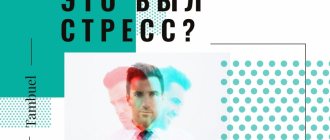O.I. Sukhoveeva
teacher at the Volga Institute
advanced training of the Federal Tax Service of Russia,
Candidate of Psychological Sciences
Today, professional stress is a very serious social phenomenon that is progressing at a tremendous pace. A person’s reaction to a stressful situation is manifested not only in psychological and emotional stress, health and performance suffer, and the quality of life in general changes. The employee is in a state of constant fatigue and loss of energy, and health problems appear. “I don’t have a job, but a lot of stress”, “I’m under constant stress”, “Such nervous stress is simply unbearable” - we can often hear such phrases from the lips of a working person. Indeed, the modern professional environment includes quite a lot of stress factors, the so-called stressors.
Stress is defined as a state of increased tension that occurs in response to a variety of extreme environmental influences.
Professional stress is considered as a tense state of an employee that arises when exposed to emotionally negative and extreme factors associated with the professional activity performed.
You need to understand very clearly that stress is not always bad: it can be beneficial for a person, a stimulator of his activity, and harmful, reducing a person’s resources and activity. According to G. Selye’s definition, such stress is called distress.
Occupational stress most often refers specifically to distress. If an employer is interested in creating safe conditions, high labor productivity, and motivating employees to achieve success in their work activities, then they cannot ignore the topic of preventing occupational stress. Work is truly one of the biggest sources of stress these days.
Psychologists say that the degree of professional stress is evidenced by a special phenomenon called “professional burnout.” The work of most people is rarely calm, measured and devoid of worries and worries. The ability of a specialist to maintain a high level of performance under conditions of psychological stress is a decisive factor for success.
When creating conditions for achieving optimal productivity and activity in professional activities, it is necessary to use systematic and comprehensive knowledge of various areas in science. One of the most important and necessary studies for both managers and ordinary employees of scientific fields is the psychology of work.
Labor psychology studies the patterns of labor activity, development and formation of a person in the process and as a result of work. One of the tasks of occupational psychology is to provide conditions for safe and effective work and to ensure the performance of employees.
In order to cope with stress, you need to understand its nature very well.
N.V. Samukina identifies the main types of professional stress (distress):
Information stress is stress associated with a high degree of decision-making responsibility in conditions of uncertainty and lack of necessary information, as well as with frequent and unexpected changes in information parameters
Emotional is stress that arises from real or perceived danger; experiences of humiliation, anger, resentment; contradictions in relationships with colleagues or management
Communication is stress associated with real problems of business communication and manifests itself in increased irritability; inability to defend against communicative aggression; failure to formulate the necessary refusal. The main manifestations of communicative professional stress are most often: irritability in business communication, the habit of communicating in a raised voice; dissatisfaction with one's job, communicative aggression: the desire to humiliate or suppress an opponent in competition, verbal aggression; open challenge to conflict, pickiness, hints, refusal to help, lies, pettiness, threats; spontaneous outbursts of rage; directed at another (blaming another) or at oneself (self-blaming).
Psychologists most often identify the following factors of professional stress:
- The employee’s working day is associated with high temporary overload, irregular working hours;
- working conditions do not meet safety and physical comfort requirements;
- an employee works in a situation of time shortage, there are many different tasks, but there is not enough time to implement them, one thing overlaps with another, all matters are urgent;
- the employee is forced to make decisions independently.
- the employee is not sufficiently informed about his professional responsibilities and the powers of his colleagues and superiors;
- high responsibility for other people and for material values;
- low degree of influence on decision making in the organization;
- difficult relationships with management, with subordinates, with colleagues;
- intrigue, manipulation pressure from colleagues, managers, subordinates
Methods for preventing professional stress:
- On the part of the organization: creating effective working and rest conditions (safe workplace, optimal work and rest schedule, creating conditions for quality rest, maintaining and restoring health, holding corporate events aimed at relieving stress and uniting the team, creating conditions for informational and psychological employee safety, a clear distribution of responsibilities between employees, respect for rights and social guarantees, a well-developed system of motivation and incentives, rewards and punishments, etc.)
- From the management side: creating a favorable socio-psychological climate, choosing the optimal leadership style (the most effective is the situational management style, one of the ineffective and most stressful is the tough and authoritarian, conniving, emergency, restructured (constant and unsystematic innovations), it is necessary to use appropriate delegation powers.
- On the employee’s part: managing one’s attitude to what is happening, developing attitudes that reduce stress, helping to respond more softly to stressful situations, developing positive life attitudes (for example: “You can’t change circumstances, change your attitude towards them”, “We must consider problems according to as they arise"; readiness to make the necessary adjustments to one’s own actions, the use of humor as an effective means of overcoming crisis situations, enjoying communication with people (relatives, colleagues, friends, neighbors, acquaintances and strangers); providing attention, help and support in relation to other people with whom you have to carry out a common task; the use of relaxation, meditation, autogenic training, giving up bad habits; developing the ability to switch to other activities (hobbies, communication with animals; a healthy lifestyle; playing sports; water procedures); compliance with the work and rest regime.
N.V. offers effective self-regulation techniques under conditions of communicative stress that can be used by almost every employee. Samoukina.
Effective techniques for dealing with stress
Preventing stress allows you to minimize the risk of adverse symptoms. At the initial stage, when the body barely noticed the threat, you can easily cope with the situation and avoid danger . Various techniques should be used to eliminate the psychological and physiological aspects of stress. It is better to use them comprehensively.
Physical exercise
Include feasible physical activity in your daily schedule - running, martial arts, fitness, cycling, walks in the fresh air, yoga. If you are short on time, a regular five-minute exercise will do. The main thing is to keep the body in good shape and not let it get bogged down in surrounding stress factors.
Any workout gives a kind of boost of endorphins, brings a feeling of peace and tranquility, moving away from the sources of stress. Don't slouch or lower your gaze: face difficulties directly and confidently, breathing deeply.
Task distribution
The main problem of entrepreneurs is the habit of taking on too many tasks. Excessive responsibility and a huge to-do list lead to a decrease in work productivity and negatively affect the emotional and physical state.
If possible, hire assistants, transferring some of the tasks to them:
- customer service manager;
- accountant;
- content marketing specialist.
If the tasks are set correctly, attracting additional personnel has a positive effect on the overall dynamics of the company's development.
Drawing clear lines between work and rest
When exhausted, the body loses productivity and does not allow one to complete work tasks 100%. It is necessary to clearly delineate time for work, sleep and rest. Taking breaks throughout the day can help prevent productivity decline.
The lion's share of problems that provoke stress syndrome lies in the lack of healthy, full sleep. To fall asleep peacefully, try not to work late into the night. It is useful to perform special breathing exercises before going to bed, listen to relaxing music, meditate, tuning into a positive mood. For normal functioning of the body and maintaining performance, you need to sleep at least 8 hours . As a last resort - at least 6. Turn off your phone at night and on weekends.
Focus on the positive
By focusing on negative factors, we look at the world through “black” glasses and do not notice the colors. Sharp remarks, criticism, breakdown of negotiations, unfounded claims from clients - you should not react to this too sharply. Constantly replaying the unwanted events of the day creates negative thinking and drags you into a state of stressful tension. As a result, a habit develops of expecting threats from every corner.
Fight this phenomenon, develop the skill of positive thinking . Thoughts shape reality. At the end of the day, take stock and think positive thoughts. Psychologists advise keeping a positive diary, regularly writing down on paper several positive events that happened today. This approach helps to shift focus in the opposite direction, form a new outlook, become happier and protect yourself from all kinds of stressors.
Control over the situation and emotions
In entrepreneurship, maximum concentration, self-discipline, and organization are important. Be responsible for the situation, take the initiative. However, do not go too far: excessive self-flagellation in case of mistakes harms the common cause and deepens the stress syndrome.
Find a middle ground between the victim position (blaming others) and a sense of hyper-responsibility. Periodic failures in business are normal. Some unpleasant situations occur regardless of the entrepreneur. Don't take all mistakes personally.
Control your emotions with self-hypnosis and life-affirming phrases. Try to react to stimuli calmly. In an impulse to express sharply negative emotions, stop, take a few deep breaths. If you notice a panic attack beginning, perform a light acupuncture massage.
Eliminate distractions
During the day, business people receive endless streams of emails, SMS, messages from instant messengers, and phone calls. This is often annoying and distracts from work. Make a personal plan and respond to distractions according to certain criteria. For example, answer letters in order of importance of the messages, and deal with messages at specific times. A great option is to use special applications for sorting letters.
Choosing the right diet
Poor nutrition creates a serious additional burden on the body's systems and increases sensitivity to stress factors. Nutritionists recommend giving up bad “office” habits in the form of fast food and a variety of tonic drinks (energy drinks, coffee, tea). It is advisable to include fresh vegetables, fruits, cereals, and protein products in your diet. Plan your menu for the day in advance. The main rule is balanced fractional meals without long breaks between meals.
Exception of suspiciousness
Looking at other people's opinions is the reason for constant frustration over trifles and the inability to concentrate on work. Eternal thoughts about the likely assessment from the outside inevitably expose the body to stress. Concentrate on work tasks without being distracted by extraneous thoughts. This is a recipe for high results that become the subject of admiration among others.
Prioritization
In order to perform tasks productively, sort them according to the Eisenhower matrix:
- Strategically important, urgent matters that cannot be delayed - urgent negotiations with partners, technical failures in the online store website system, current innovations, urgent problems with key clients.
- Important, not urgent tasks are assessing results, planning new projects, prospects, establishing relationships with customers.
- Urgent, unimportant matters - phone calls, meetings, answering letters, working with documents, planning meetings with subordinates.
- Non-urgent, unimportant tasks. Ordinary routine work, distracting little things.
Rules of conduct under stress:
- observe yourself (meaning, it is necessary to monitor and realize changes in your reactions and behavior in a situation of stress);
- look for ways to “stop” yourself (such as “take a break”, “take a break in communication”);
- transfer your energy to another form of activity (get distracted and switch to another activity);
- think about what helps relieve stress (What makes you more happy? What do you do with passion?...).
All of the above recommendations can help an employee learn to control the level of stress received during professional communication, regulate their behavior, stop “getting hung up” on the negative emotions received, and not take to heart situations that are most often associated not with a personal threat, but with the general psychological tension of the team when solving a general problem.
Thus, the employer’s task is to create optimal conditions for the employee, but an important resource is also the independent and conscious preventive work of the employees themselves, which must be stimulated through various organizational measures.
Sports, sports, sports
Svetlana Mustaeva , Candidate of Medical Sciences, Head of the Center for Sports Medicine, Exercise Therapy and Physiotherapy:
— As a practicing physician, I regularly work with patients who neglected reasonable physical activity, that is, did not engage in prevention. My advice to anyone who wants to relieve stress at work: exercise at least three times a week.
How does sport help? It promotes the production of endorphins - hormones that mobilize blood supply. Improving blood supply, in turn, increases performance, eliminates congestion, and increases microcirculation in the vessels. Especially in the brain, which programmers use so actively. IT specialists have sedentary work, and this can cause congestion in the pelvic area. The result is decreased libido, prostatitis in men, and reproductive health problems in women. Sports and fitness will help you avoid these troubles, which in themselves cause stress.







